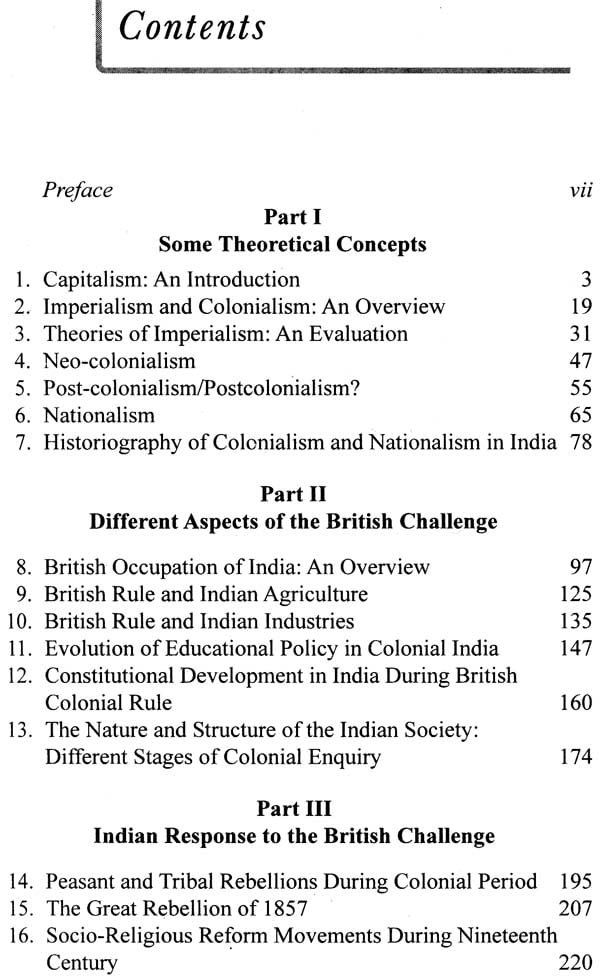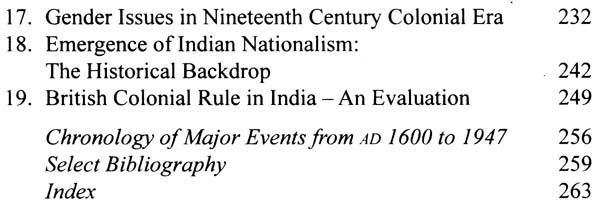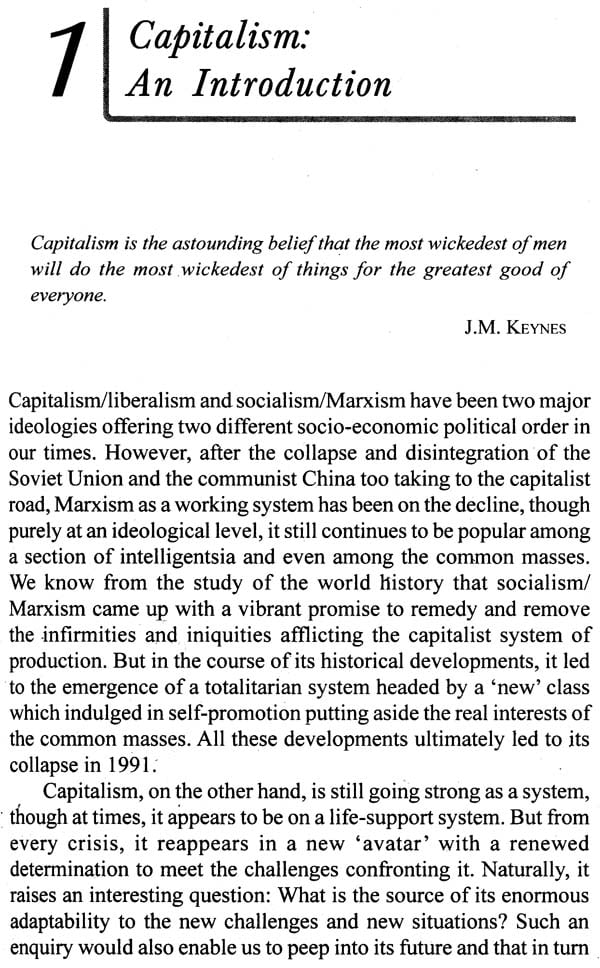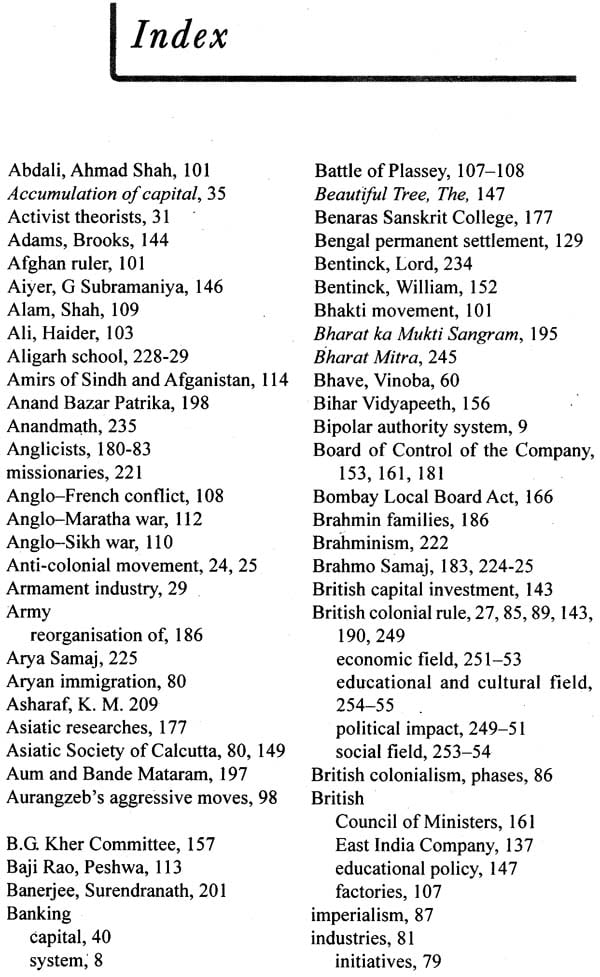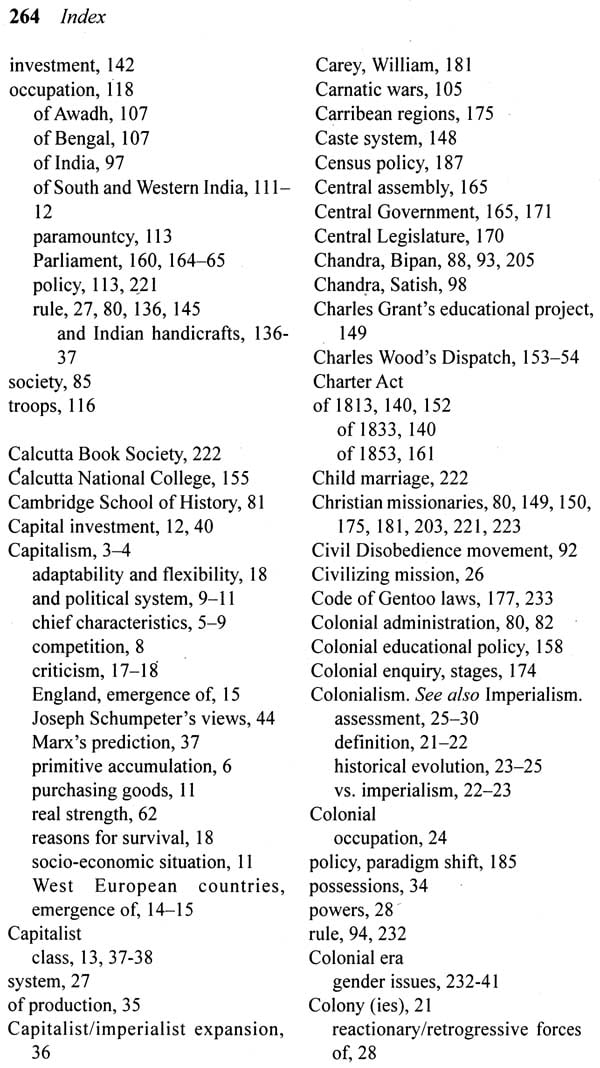
Colonialism in India
Book Specification
| Item Code: | NAQ747 |
| Author: | Rama Chandra Pradhan |
| Publisher: | Prabhat Prakashan, Delhi |
| Language: | English |
| Edition: | 2017 |
| ISBN: | 9789352664344 |
| Pages: | 281 |
| Cover: | PAPERBACK |
| Other Details | 8.50 X 5.50 inch |
| Weight | 300 gm |
Book Description
Colonialism in India primarily delineates the process of the British occupation of India and its long-term impact on the various aspects of our national life. For a better understanding of the issues involved, it starts with introductory essays on some of the theoretical concepts like capitalism, colonialism, neo-imperialism, post-colonialism and nationalism. It is based on the authors's life-long engagement both in terms of research and teaching. It marks a departure from the usual history books as its approach is inter-disciplinary. To that end, it adopts a thematic rather than a chronological order.
It is basically designed as a textbook for both undergraduate and postgraduate students including those of Political Science and History. It is based on new and updated sources and marked by lucidity and felicity of linguistic style. Besides, it is free from ideology-based debunking and wooly sentimentalism. The book would prove useful to students of Political Science and History, civil service examinees and even for the general readers.
Ram Chandra Pradhan, a well-known social activist and Gandhian Scholar, taught at Ramjas College, University of Delhi for several decades. As one of the conveners of the Lokayan project and as an activist thinker of the Movement for Peace and Alternative Development, he travelled all over the world and interacted with activists and scholars across the continents. Dr. Pradhan has been a recipient of the Senior Fulbright Fellowship (1979-80) and the Indo-Canadian Shastri Fellowship (1993). He is the author of several books including Raj to Swaraj, Raj se Swaraj (Hindi) and Reading and Reappraising Gandhi. He is engaged in writing a multi-volume study of the Indian Socialist Movement. Presently, he is an Honorary Visiting Fellow at the Institute of Gandhian Studies, Wardha (Maharashtra).
I taught a course on 'Colonialism and Nationalism' in India for several decades at Ramjas College, University of Delhi. The idea of writing an authentic and standard textbook on the subject cropped up during my teaching years. The primary reason for such a felt-need was the absence of a standard textbook on the themes covered by the course. True, there are several history books. But they suffer from two major limitations. One, they are too heavy on facts and somewhat short on political developments and their analyses. Two, they appear to have fallen between two stools of research and textbook writings.
Prompted by all these reasons, I penned, Raj to Swaraj: A Textbook on, Colonialism and Nationalism in India which is being used by a large section of the teaching and student community. It has run through several reprints and has a Hindi version also. There is a plan to get it translated in several regional languages of India. I followed up with another book Reading and Reappraising Ganthi. Both these books present a comprehensive picture of our national movement.
However, on account of the introduction of the semester system in several Indian universities, including the Delhi University, there has been a separation of colonialism and nathionalism on semester basis. Hence, there has been a felt-need for a separate volume on colonialism as several new themes including the concepts like capitalism, colonialism, post-colonialism etc., have been included in the new syllabus. The present work attempts to cover all these themes between the two covers of the book.
I have retained my basic approach of an inclusive presentation of all viewpoints in this work as I have done in my earlier works. Such an approach is based on my conviction that any doctrinaire approach violates the basic norms of the textbook writings. Besides, it alone could enable the readers to see through the smokescreens created by the passionate argumentation and counter argumentation of the rival schools.
So far the arrangement of the material is concerned; I have adopted a thematic instead of a chronological order. Besides, several other reader-friendly measures have been taken viz. lucid and facile style, a fine balance between factual presentation and interpretative evaluation; interweaving each chapter with its historical context, so that each of them could be read independently. The book is divided in three parts. Part I deals with major theoretical concepts like capitalism, colonialism, imperialism, post-colonialism and nationalism. Part II deals with the issue of the British occupation of India and its overall impact on the several aspects of our national life. The major theme of Part III of the book is how India responded to the British challenge in thrce different ways: armed rebellion, socio-religious reform movement and through the emergence of national movement.
I owe a lot of intellectual debt to a number of scholars whose books I have used in the preparation of the present work. The list of such scholars includes historians like R. C. Majumdar, Tara. Chand, B. R. Nanda, Bipin Chandra, Sumit Sarkar and Partha Chatterjee, and sociologists like T. N. Madan, D. L. Seth and political scientists like Rajani Kothari and Ramashray Roy. Macmillan Publishers India Ltd has been more than supportive of all my works.
In a book like this, it is quite natural for a few errors to have crept in both in terms of facts and interpretations. I invite my readers to join me in identifying them. However, presently, I alone should be taking the responsiblity for any error on these counts.
**Contents and Sample Pages**
